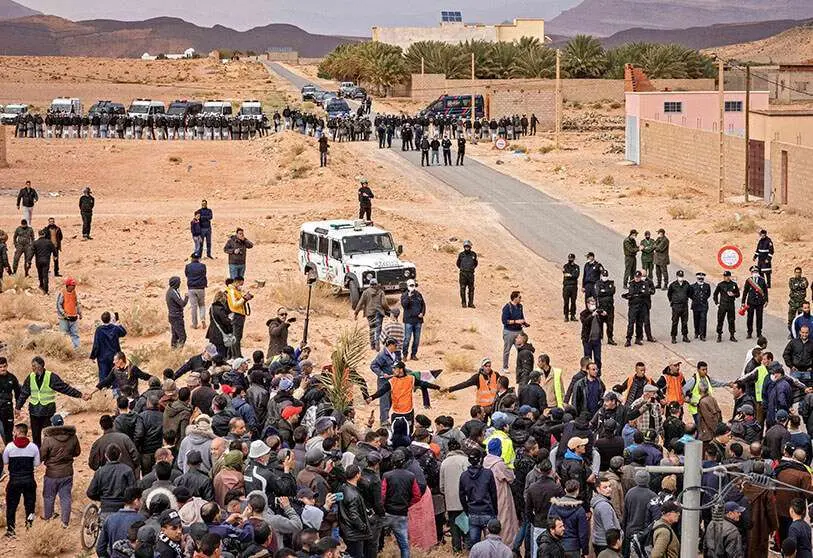Manifestaciones en Marruecos contra las expulsiones de agricultores en la frontera argelina

The inhabitants of Figuig, a town in the far east of Morocco, have expressed their indignation at the decision of the Algerian authorities to expel some thirty Moroccan farmers from a palm grove they were cultivating a few kilometres away, but on the Algerian side of the border. On the afternoon of Thursday 18 March, hundreds of demonstrators went to the palm grove to protest against the decision. On the other hand, they were angry with the Moroccan authorities, who did not contest the expulsion.
The border line between Morocco and Algeria is defined by an agreement signed between the two countries in 1972. According to this agreement, the authorities of both countries seem to agree that the Arja oasis is part of Algerian territory. However, Moroccan farmers have been free to exploit this palm grove since the 1990s.

In February, the Algerian authorities asked the Moroccan farmers to leave the area within three days. Following negotiations with the Moroccan authorities, this deadline was extended to 18 March.
On Thursday 18 March, the Moroccan police finally prevented the demonstrators from reaching Arja, presumably to avoid any friction with the Algerian Gendarmerie, which had taken possession of the area. The march was eventually diverted to the town centre of Figuig and ended with a sit-in.
"Once again, we are the ones who pay!" The inhabitants of Figuig, a historic oasis on the border of Morocco and Algeria, are suffering from the renewed tensions between the two countries, which now forbid them to grow dates in the Algerian border area.

"For 30 years Algeria and Morocco have let us farm without any problems, and now we don't know who to turn to," Abdelmalik Boubekri, a farmer forced to abandon the date palms that have sustained his family for three generations, told AFP. In recent days, the 71-year-old has demonstrated several times to protest against this "injustice" that will mean "the death of Figuig".
On Thursday, in Figuig, a march mobilised some 4,000 people, according to the organisers, half the population of this town on the border between the Atlas and the Sahara. "Everyone feels aggrieved, agriculture is the only resource, there is no work here, there are no factories," said Mohamed Jabbari, 36, one of the "unemployed youths" who came to support the farmers.
Algeria justified the "securing of the border" by the "deficiencies" of the farms and the existence of "organised criminal gangs involved in drug trafficking", arguments that were strongly contested in Figuig. "These expulsions are a political decision", said Mohamed El Jilali, president of a local association. The Algiers move has not provoked any official reaction in Rabat. The only response: Moroccan regional authorities have organised a meeting to "examine possible solutions to mitigate the repercussions" of this "temporary and short-term" decision.
Founded at the time of the first caravans, the ancient trade crossroads had already begun to decline with the establishment of the border in 1845, before becoming a dead end due to diplomatic disputes. Located about ten hours' drive from Rabat, the oasis struggles to attract tourists, although the beauty of its landscapes and architecture have it dreaming of being included on UNESCO's World Heritage list.

In addition, over the years, farmers have abandoned their historic perimeter to plant "extensions" in the vicinity and beyond the rambla, using the water table to irrigate their crops. The new areas are much more productive than the traditional adobe gardens irrigated by a complex network of hand-built pipes. The area of Arja, the area evacuated this week, covers some 1,500 hectares, with many "Aziza" dates, a much sought-after variety.
Abedelmalik Boubekri says he left behind "30,000 palm trees", some of which were planted by his grandfather. "Years of work" he says are worth more than 5 million dirhams" (about 500,000 euros), with dates selling for up to 150 dirhams a kilo (about 15 euros). Like the thirty or so farmers evicted from Arja, this farmer claims to have a "historic right" to the land, brandishing a photocopy of a handwritten notarial deed from 1939.
However, these evictions are not the first. In 1975, farmers in Figuig were forced to abandon their crops after tensions over Western Sahara escalated. At that time, during the Green March, tens of thousands of Moroccans had taken over the former Spanish colony in northern Mauritania. After almost thirty years of ceasefire, tensions over the issue resurfaced in the late 2020s.

Even hundreds of kilometres away, Figuig fears paying the price again with the loss of date producers. After the 1975 evictions, a wave of emigration to the big cities or to Europe had already emptied the oasis of half its inhabitants, leaving abandoned houses, fallow gardens and crumbling walls. And in the "ancestral" plots on the other side of the wadi, "everything has been abandoned", laments Rajae Boudi, a descendant of a "wronged" family.
The 114-hectare Arja palm grove has between 10,000 and 15,000 palm trees, which the farmers had to abandon. They feel expropriated and are now demanding compensation from the Moroccan and Algerian authorities. The Moroccan Lawyers' Club has announced that it has set up a crisis unit with the intention of taking the case to the Algerian courts.








